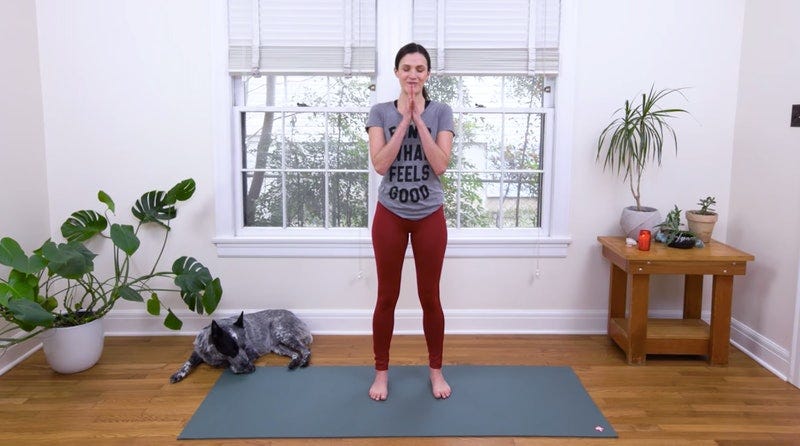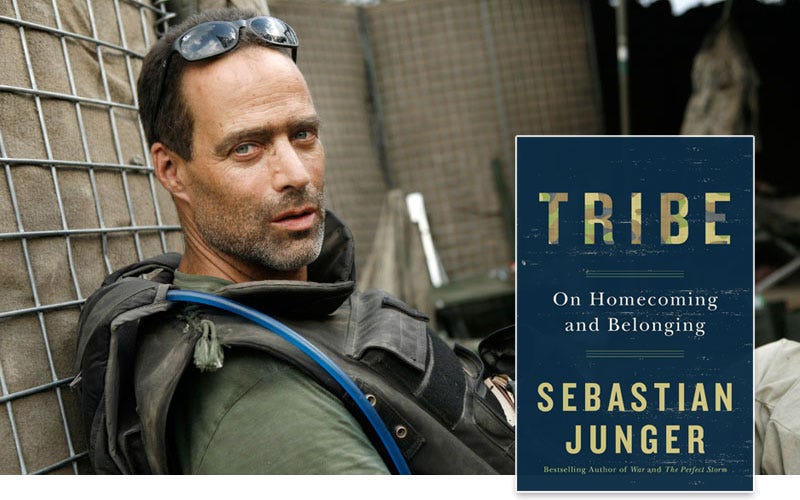I’m not sure whether this is insightful or so fucking obvious that nobody has bothered to write it down, but it seems to me that the second season of Lockdown Australia is so bleak not just because it was avoidable, but because it’s missing the hope and solidarity that made the original bearable.
Fifteen months (or is it fifteen years?) later, it’s easy to look back on the early days of the pandemic through a cynical lens. The emblematic activities of that time – furious sourdough baking, Yoga with Adriene1, Zoom drinks and House Party – do seem pretty cringe in retrospect.
But it’s worth remembering that for a couple of months, irony wasn’t up to the job. The world as we knew it seemed to be ending and we responded earnestly.
There was a sense that things could, and would, be different when it was all over. Did you tell yourself that from now on, you would concentrate on the things that really mattered? I did.
The yoga, the baking, the knitting and the sunset walks were just the most Instagrammable examples, each artfully styled post a declaration of a new attitude to life.
And if you were progressive, there was a sense, or at least a hope, that society might be transformed for the better. Around the world, governments of all stripes enacted radical policies to avoid economic disaster. Even the sourdough and the yoga, fetishised and commodified though they were, pointed to an off-ramp from the planet-consuming toll road of consumerism.
Those months also featured an undeniable unity of purpose otherwise missing from modern life. Even small actions like staying home and putting on a mask made us feel like part of something bigger. For the 2.5 minutes before it was coopted to sell car insurance and sneakers, the phrase “we’re all in this together” felt like it might mean something.
“Essential workers” were celebrated with open gratitude. People stood in their front lawns banging pots and pans for doctors and nurses. I worked as a food delivery rider in Toronto, and regularly made $70 a night in tips, often accompanied by thankful messages. One woman texted “thank you for your service”, as if I’d stormed the beaches at Normandy. I guess she really needed that Junior Burger Combo.
It’s easy to dismiss these things as empty gestures – a criticism many people made even at the time, given they did not result in improved wages, conditions or healthcare funding – but my point is that there was a general sense of cohesion, not that it was justified.
Of course these feelings were tempered by some degree of scepticism (or realism – I don’t think anybody expected the current Australian Liberal government to embark on a giant expansion of the welfare state) but I think most of us allowed ourselves to feel like part of a community, to hold out some hope that this was a turning point.
I may not have this right, but I remember Aussie author Ben McKelvey tweeting about Sebastian Junger’s book Tribe one day early on, and how it would help explain our feelings about the pandemic in years to come. I think he was right, but we only needed to wait a year and a half.
Junger’s thesis, derived from observation of hunter gatherer societies and combat veterans, is that what makes life satisfying is not comfort, but the idea that we’re part of a community in action.
“Humans don’t mind hardship, in fact they thrive on it; what they mind is not feeling necessary. Modern society has perfected the art of making us feel not necessary,” he writes.
Which brings us to August 2021, with our three biggest cities locked down while social media and the news are filled with bizarre interstate bickering.
In Australia, it’s now clear that being in it together was either an illusion or a transitory state. Foreign celebrities come and go as they please while Australians die waiting to get home. State premiers snipe at each other in duelling news conferences. The defence force is deployed to enforce compliance in marginalised areas while the wealthy enjoy bottled negronis delivered by gig economy peons.
A year ago it would have been difficult to imagine getting to a point where “despite the army being deployed, Sydney is not locked down hard enough,” was a popularly held opinion, but here we are.


Clearly much of this has to do with simple fatigue, but it’s also that our leaders betrayed us. They wasted our sacrifice, made it meaningless. Now we’re being asked to repeat the sacrifice, but the meaning has gone and so too has the hope.
Nothing much changed. Earlier this year the government made the deliberate decision to send welfare recipients back below the poverty line. The workers we rely on gained no extra pay, no better conditions.
And when Australia enjoyed virtually restriction-free life for the second half of 2020 and the first half of 2021, the “new normal” looked a lot like the old normal, only more smug.
That’s on us too. The depressing fact is that for all our promises to focus on the things that really matter, when lockdown lifted, most of us went back to doing the same old shit we always have. Spending too much money on stuff we don’t need, working too hard, drinking too much, posting ironic bullshit and not calling our mothers as much as we should2.
Now we’re back in lockdown, and some of us have gone back to baking (ask me about my lemonade scone recipe) and sunset walks, but these activities no longer feel like steps toward a different life. They’re just something to do to pass the time, not much different from getting into insane arguments about the miniscule differences between stay-at-home orders on Twitter.
Lockdowns look set to drag on until we reach the necessary level of vaccination. They suck even worse now because we no longer feel like we’re useful, or that a better world beckons at pandemic’s end. We’re back to feeling not necessary.
Sponsor me to run a long way
I was going to do my first marathon in Melbourne in October but I’m getting strong “that ain’t happening” vibes. So instead I’m going to do a solo marathon to raise money for the Aboriginal Legal Service. For your enjoyment, I will wear VB footy shorts and a pair of obnoxious sports sunglasses. Please consider donating, or just click the link to see the sunnies.
Yoga with Tim is where it’s at anyway.
I think this paragraph specifically and this essay in general are heavily influenced by Bridie Jabour’s fantastic book Trivial Grievances (though she would say that spending lots of money and getting drunk are pretty good, actually, and we shouldn’t beat ourselves up about them). Anyway, I lent my copy to a mate so I can’t check how heavily I’m plagiarising. Sorry Bridie.





I don't know about obvious but you articulated everything I've been feeling about lockdown 2021 perfectly, so cheers for that.
Call your mum.